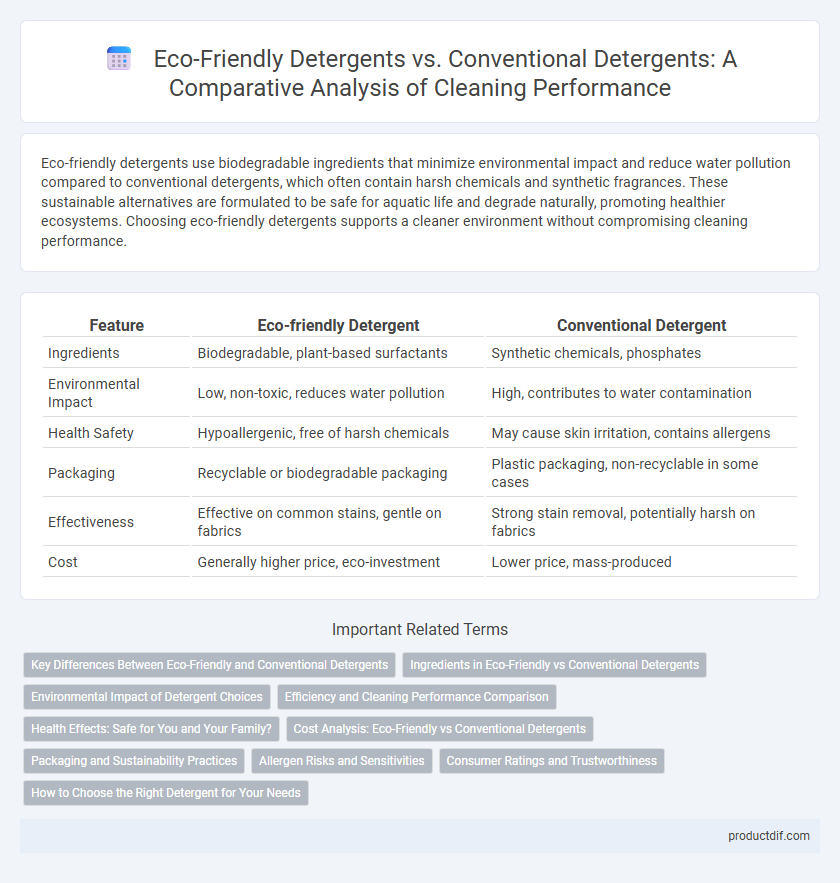Eco-friendly detergents use biodegradable ingredients that minimize environmental impact and reduce water pollution compared to conventional detergents, which often contain harsh chemicals and synthetic fragrances. These sustainable alternatives are formulated to be safe for aquatic life and degrade naturally, promoting healthier ecosystems. Choosing eco-friendly detergents supports a cleaner environment without compromising cleaning performance.
Table of Comparison
| Feature | Eco-friendly Detergent | Conventional Detergent |
|---|---|---|
| Ingredients | Biodegradable, plant-based surfactants | Synthetic chemicals, phosphates |
| Environmental Impact | Low, non-toxic, reduces water pollution | High, contributes to water contamination |
| Health Safety | Hypoallergenic, free of harsh chemicals | May cause skin irritation, contains allergens |
| Packaging | Recyclable or biodegradable packaging | Plastic packaging, non-recyclable in some cases |
| Effectiveness | Effective on common stains, gentle on fabrics | Strong stain removal, potentially harsh on fabrics |
| Cost | Generally higher price, eco-investment | Lower price, mass-produced |
Key Differences Between Eco-Friendly and Conventional Detergents
Eco-friendly detergents contain biodegradable ingredients and plant-based surfactants that minimize environmental impact, whereas conventional detergents often include synthetic chemicals and phosphates that can harm aquatic ecosystems. Eco-friendly options usually feature lower toxicity levels and avoid artificial fragrances, reducing allergic reactions and pollution. In contrast, conventional detergents may provide stronger stain removal but contribute to water contamination and chemical buildup.
Ingredients in Eco-Friendly vs Conventional Detergents
Eco-friendly detergents use biodegradable and plant-based ingredients such as enzymes, surfactants, and natural essential oils, minimizing environmental impact and reducing toxicity to aquatic life. Conventional detergents often contain synthetic chemicals like phosphates, sulfates, and artificial fragrances, which can cause water pollution and pose health risks over time. These differences in ingredient composition highlight the sustainable benefits of eco-friendly detergents in promoting safer household cleaning practices.
Environmental Impact of Detergent Choices
Eco-friendly detergents significantly reduce environmental pollution through biodegradable ingredients and low toxicity, minimizing waterway contamination and aquatic life harm. Conventional detergents often contain phosphates and synthetic chemicals that contribute to eutrophication and persistent pollution. Choosing eco-friendly options supports sustainable water management and reduces carbon footprint compared to traditional detergent formulations.
Efficiency and Cleaning Performance Comparison
Eco-friendly detergents utilize biodegradable ingredients that effectively break down dirt and stains while minimizing environmental impact, often matching or exceeding the cleaning power of conventional detergents. Conventional detergents rely on synthetic chemicals and surfactants that can deliver strong grease-cutting performance but may leave harmful residues and contribute to water pollution. Efficiency tests reveal that many plant-based or enzyme-enhanced eco-friendly formulations achieve comparable soil removal rates with less water and energy usage, making them both powerful and sustainable cleaning solutions.
Health Effects: Safe for You and Your Family?
Eco-friendly detergents use biodegradable ingredients free from harmful chemicals like phosphates and synthetic fragrances, reducing skin irritations and respiratory issues common with conventional detergents. Conventional detergents often contain harsh substances such as sulfates and parabens, which can trigger allergies, eczema, and long-term health risks. Choosing eco-friendly options promotes safer indoor air quality and minimizes exposure to toxins for you and your family.
Cost Analysis: Eco-Friendly vs Conventional Detergents
Eco-friendly detergents often have a higher initial cost compared to conventional detergents, but they offer savings through concentrated formulas requiring less product per wash. Conventional detergents may be less expensive upfront but can contain harsh chemicals that lead to higher expenses in plumbing maintenance and environmental impact fees over time. Considering lifecycle costs, eco-friendly options typically provide better economic value by minimizing health risks and reducing environmental cleanup costs.
Packaging and Sustainability Practices
Eco-friendly detergents prioritize biodegradable, recyclable packaging made from post-consumer recycled materials to minimize environmental impact. Conventional detergents often use non-recyclable plastic containers, contributing to landfill waste and pollution. Sustainable practices in eco-friendly brands include refill stations and concentrated formulas that reduce packaging volume and carbon footprint.
Allergen Risks and Sensitivities
Eco-friendly detergents minimize allergen risks by using natural, hypoallergenic ingredients that reduce skin irritation and respiratory sensitivities. Conventional detergents often contain synthetic fragrances, dyes, and harsh chemicals that can trigger allergic reactions and exacerbate conditions like eczema or asthma. Choosing eco-friendly options supports a safer environment for sensitive individuals, promoting healthier skin and indoor air quality.
Consumer Ratings and Trustworthiness
Eco-friendly detergents receive higher consumer ratings due to their biodegradable ingredients and reduced environmental impact, fostering greater trust among eco-conscious buyers. Conventional detergents often contain harsh chemicals that may cause skin irritation, leading to lower trustworthiness scores despite their effective cleaning power. Trust in eco-friendly products is bolstered by certifications from recognized environmental organizations, which conventional detergents rarely attain, influencing purchasing decisions significantly.
How to Choose the Right Detergent for Your Needs
Choose an eco-friendly detergent to reduce environmental impact with biodegradable ingredients and minimal chemical additives, ideal for sensitive skin and sustainable living. Conventional detergents offer strong stain removal and affordability but may contain phosphates and synthetic fragrances that harm waterways. Evaluate your household's cleaning requirements, skin sensitivities, and environmental priorities to select the detergent that best balances effectiveness and eco-consciousness.
Eco-friendly detergent vs Conventional detergent Infographic

 productdif.com
productdif.com